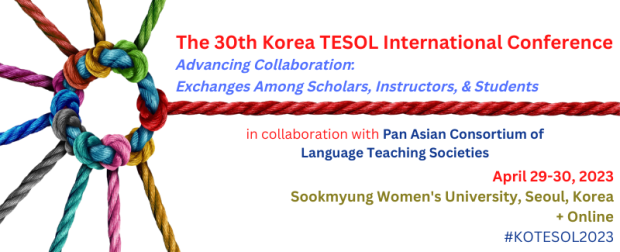
In 2019, Julio Gregorio Mora-Ruano, Jörg-Henrik Heine, and Markus Gebhardt[1] drew specific attention to the reality that collaboration among teachers has enormous positive effects for the entire educational community. They showed that improved collaboration not only benefits instructors but also has a substantial positive effect on student achievement.
With that in mind, the theme of the 30th Korea TESOL International Conference, “Advancing Collaboration: Exchanges Among Scholars, Instructors, & Students,” seeks to enhance both the teaching and learning experience by encouraging the educational community to practically engage with and highlight collaboration in its various forms and the wider impact collaboration has for learning, teaching, and scholarship.
This conference invites proposals on various topics related to collaboration in education, as well as more disparate topics. How can the positive effects of collaboration be promoted and enhanced? How can we more effectively collaborate? What forms of collaboration are notably beneficial?
Proposals are invited on all topics, but we are particularly interested in sessions exploring a few relevant areas:
- Expansion of our current understanding of the wider implications of collaboration. Such expansion allows us to better identify and engage in beneficial collaboration.
- Research on the place and integration of collaboration into existing methodologies and pedagogical approaches.
- The benefits to education of exploring collaboration beyond the strict educational community. What benefits are there in teachers collaborating with the wider community or far flung communities?
.
We encourage presenters to bring their own unique experiences, research, and approaches to the conference. Let’s make the 30th Korea TESOL International Conference an event of collaboration and educational enrichment.
[1] Mora-Ruano, J. G., Heine, J.-H., & Gebhardt, M. (2019). Does teacher collaboration improve student achievement? Analysis of the German Pisa 2012 sample. Frontiers in Education, 4. https://doi.org/10.3389/feduc.2019.00085


